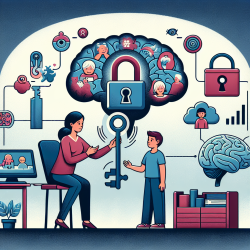Introduction
As practitioners in the field of speech language pathology, we are constantly seeking ways to enhance our therapeutic approaches and achieve better outcomes for children. One area that holds significant promise is the understanding and application of autobiographical memory research, particularly in individuals with schizophrenia spectrum disorders. A recent review of autobiographical memory studies sheds light on cognitive deficiencies in these patients and offers valuable insights that can be applied to our practice.
Understanding Autobiographical Memory Deficits
Autobiographical memory (AM) is crucial for self-identity, learning from experiences, and social communication. Patients with schizophrenia often exhibit impaired AM, characterized by less specific memories and earlier reminiscence bumps compared to healthy individuals. This impairment is linked to working memory deficits, disturbances in self-concept, and the methods used to cue memory retrieval.
Applying Research Insights to Practice
The review highlights several key findings that can inform our practice:
- Memory Specificity and Coherence: Cognitive training can improve memory specificity and coherence in patients. By incorporating structured memory retrieval exercises into therapy, practitioners can help children develop more detailed and coherent autobiographical memories.
- Impact of Comorbid Conditions: The relationship between comorbid depression and memory specificity is complex. While depression levels may not directly correlate with memory specificity, interventions that focus on enhancing memory detail can still be beneficial.
- Role of Psychotic Symptoms: The link between psychotic symptoms and memory specificity remains inconclusive. However, understanding this relationship can guide the development of targeted interventions that address both cognitive and emotional aspects of schizophrenia.
Encouraging Further Research
While the review provides valuable insights, it also highlights areas that require further exploration. Practitioners are encouraged to engage in research that examines the impact of different memory activation methods, the role of self-discrepancy in memory retrieval, and the effects of cultural factors on autobiographical memory. By contributing to this body of knowledge, we can refine our therapeutic approaches and improve outcomes for children with schizophrenia spectrum disorders.
Conclusion
Autobiographical memory research offers a wealth of information that can enhance our understanding and treatment of cognitive deficits in children with schizophrenia. By integrating these insights into our practice and pursuing further research, we can empower children to achieve their full potential.
To read the original research paper, please follow this link: A review of autobiographical memory studies on patients with schizophrenia spectrum disorders.










